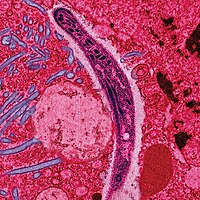
Photo from wikipedia
BACKGROUND No research was conducted on the clinical characteristics and outcomes of Infectious Disease Units (IDU) managed homeless patients (HP). METHODS We conducted retrospectively a survey among 98 HP and… Click to show full abstract
BACKGROUND No research was conducted on the clinical characteristics and outcomes of Infectious Disease Units (IDU) managed homeless patients (HP). METHODS We conducted retrospectively a survey among 98 HP and 98 non-HP admitted between 2017 and 2018 in several IDUs in Marseille, France. RESULTS HP were more likely to be migrant, to report frequent alcohol consumption or illicit drug use, and to present with respiratory symptoms at admission compared to controls. The most common final diagnoses in HP were respiratory tract infections (other than pulmonary tuberculosis [PTB], 35.7%), sexually transmitted infections (20.4%), cutaneous and mucosal infections (19.4%) and tuberculosis (12.2%). Sexually transmitted infections and ectoparasite infestations were significantly more frequent in HP compared to controls. One HP died from pleural effusion as a complication of PTB. The surviving HP had a longer length of stay (LOS, average 11.6 ± 13.6 days, p < 0.0001) than controls; independent factors of increased LOS were tobacco use (p = 0.009), tuberculosis infection (p < 0.0001), urinary tract infection (p = 0.018) and bacteraemia (p = 0.018). After hospital discharge, attendance at subsequent planned consultations was significantly lower in HP (0.72 ± 1.25 times/persons) compared to controls (2.03 ± 2.2). CONCLUSIONS We suggest that HP present specific demographic characteristics and patterns of infectious diseases compared to other patients and require adapted management.
Journal Title: Travel medicine and infectious disease
Year Published: 2020
Link to full text (if available)
Share on Social Media: Sign Up to like & get
recommendations!